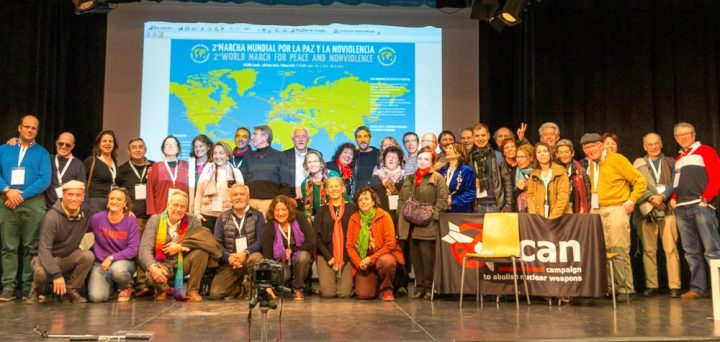The official launch of the 2nd World March for Peace and Nonviolence took place on the 7th of November, 2018, during the 2nd World Forum on Urban Violence and Education for Coexistence and Peace, in Madrid.
The 2nd World March, promoted and coordinated by the international humanist association, World without Wars and Violence, will kick off 10 years to the day since the 1st World March, on the 2nd of October 2019, and will finish on the 8th of March 2020, after 158 days circumnavigating the world, starting and ending in the Spanish capital. The 2nd of October is the International Day of Nonviolence, and the 8th of March is International Women’s Day.
The launch event was presented by March Coordinator, Rafael de la Rubia, and counted on the presence of Beatrice Fihn (Executive Director of ICAN), Pedro Arrojo (Member of Congress), Josep Mayoral i Antigas (Mayor Granollers, and Vicepresident of Mayors for Peace),
The World March’s primary focus this time is on the problem of nuclear weapons, and will actively work to help ICAN achieve entry into force of the Treaty on the Prohibition of Nuclear Weapons by the time the March ends on March 8, 2020.
In addition, the March will push to eradicate hunger and discrimination, promote global citizenship, combat climate change and environmental destruction, reform the United Nations – especially the UN Security Council – and work to promote a culture of “peace, nonviolence, dialogue and solidarity.”
The March aims to inspire a wave of social actions that will sweep around the world, leading people everywhere to take actions for peace and nonviolence, adapted to whatever the local situation is.
The organisers presented human peace- and nonviolence-symbol formations as a tried and tested method of mobilising people, especially young children, into large scale actions. In the last two years, it is estimated that up to 40,000 school children have taken part in such actions. Marches, concerts, conferences and forums are other activities that are expected to take place during the 2nd World March.






